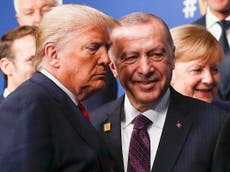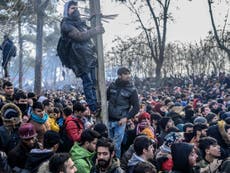We’re on the cusp of another refugee crisis – Europe can’t afford to call Erdogan’s bluff
Turkey’s president is wrong to leverage refugees in his attempts to twist the EU’s arm. But whatever the outcome, the humanitarian consequences deserve our attention

More than 10,000 refugees massing at the Greek border have once again become pawns in a geopolitical game, as chinks appear in “Fortress Europe”.
Turkey has been accused of weaponising migrants after it opened its land border with Greece on Saturday. The move violates a deal struck with the European Union in 2016, in which Turkey agreed to stem the flow of people to the EU in return for €6bn (£5.16bn).
On Sunday night, Greek authorities repelled 9,877 people from conflict-ridden countries, such as Syria, Afghanistan, Libya and Somalia, as they tried to enter Greece. The deployment of the military to ward off those seeking a better life in Europe resulted in violent clashes involving stun grenades and tear gas in the no-man’s land between the Turkish and Greek borders. On Monday, a four-year-old boy drowned when a boat capsized off Lesbos.
What does all this mean for Europe? With reports of 10,000 migrants attempting to cross into Greece and Bulgaria, EU leaders will no doubt be growing increasingly uneasy. Not necessarily in response to the refugees themselves but because talk of large numbers of people gathering on the edge of Europe is a boon to the far-right. The prospect of another “migrant crisis” such as in 2015 is a gift to sensationalist populist propaganda. Already on Monday, not without a hint of smugness, Matteo Salvini, leader of Italy’s far-right Lega party, tweeted “Not long ago, Erdogan threatened to send MILLIONS of immigrants. Madness. Remember?”. With local elections in France, and regional elections in Germany and Austria coming up in March, the current crisis risks fueling far-right fires.
On Sunday evening, Greece announced it would suspend EU asylum law for a month and send all those entering illegally back to Turkey. Greece’s response is not only unsustainable, but is forbidden by EU asylum law. In particular, the measures risk violating the principle of non-refoulement, or the guarantee that no one may be returned to a country where they are likely to face persecution. Tensions are running high; Greece’s response, including its accusation that Turkey has “become a smuggler itself”, is evidence of its desperation.
What impact might Turkey’s decision to open the border have on EU-Turkey relations? Turkey’s president, Recep Tayyip Erdogan, has expressed his anger at the EU’s perceived failure to keep its side of the bargain and help Turkey cope with the strain of hosting 3.6 million Syrian refugees.
Equally, Erdogan is seeking greater European support in northern Syria, where Turkey has launched an operation against Russian and Syrian forces, led by Bashar al-Assad. In a bid to be taken seriously and fed up with what he perceives as the EU’s empty promises, Erdogan has targeted one of the bloc’s sorest points: its borders.
In his last-ditch attempt to capture the EU’s attention, has Erdogan burned his bridges? The Turkish president may well have gone too far, prompting EU leaders to lose any appetite for renegotiating a deal with Turkey. Whether Europe will be drawn further into the war in Syria remains to be seen. Likewise, whether this will spark another full-blown crisis, and to what extent this will propel Europe’s political right, is not certain. Whatever the outcome, however, the humanitarian consequences deserve our attention.
Europe has failed to find a humane response to the so-called refugee crisis. The Minniti deals that Italy struck with Libya in 2017 may have reduced the flow of migrants across the Mediterranean by approximately 85 per cent, but there were serious human rights concerns (tens of thousands of vulnerable people were trapped in detention centres in Libya). Now, thousands of desperate people are having their hopes raised, only to be dashed as they come up against violence on the ramparts of “Fortress Europe”.
Hope can be a fragile thing; Turkey may well be struggling, but Erdogan is wrong to leverage refugees in his attempts to twist Europe’s arm. The international community must condemn the Turkish president’s use of migrants as pawns in his great game of geopolitical chess.






Join our commenting forum
Join thought-provoking conversations, follow other Independent readers and see their replies